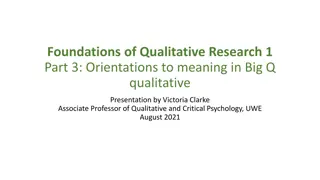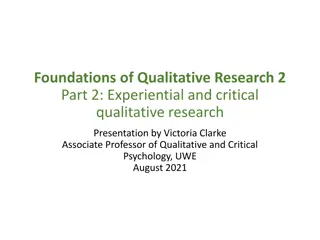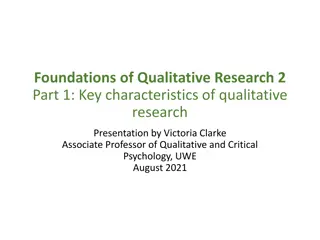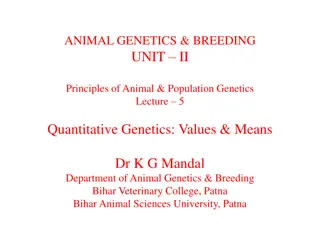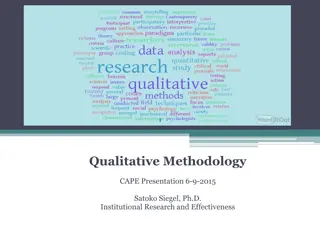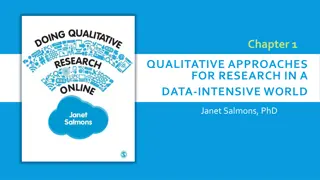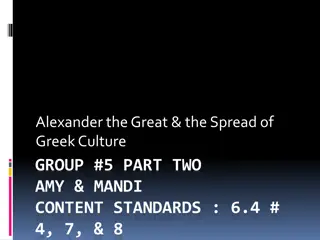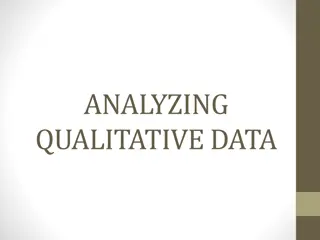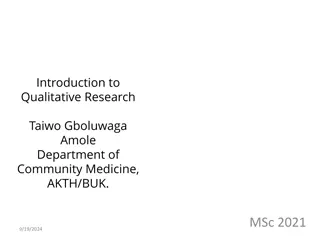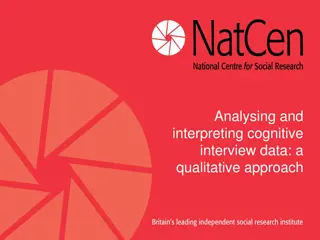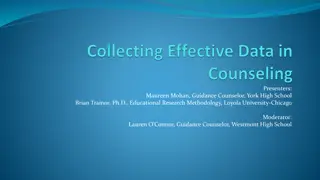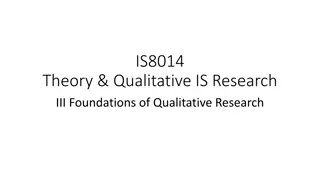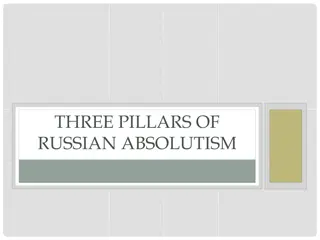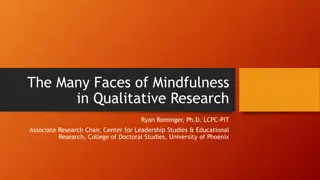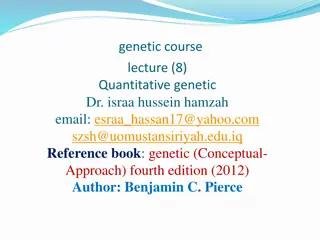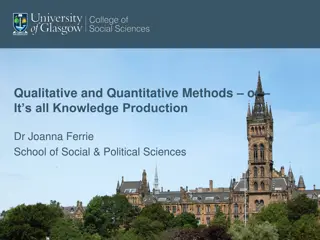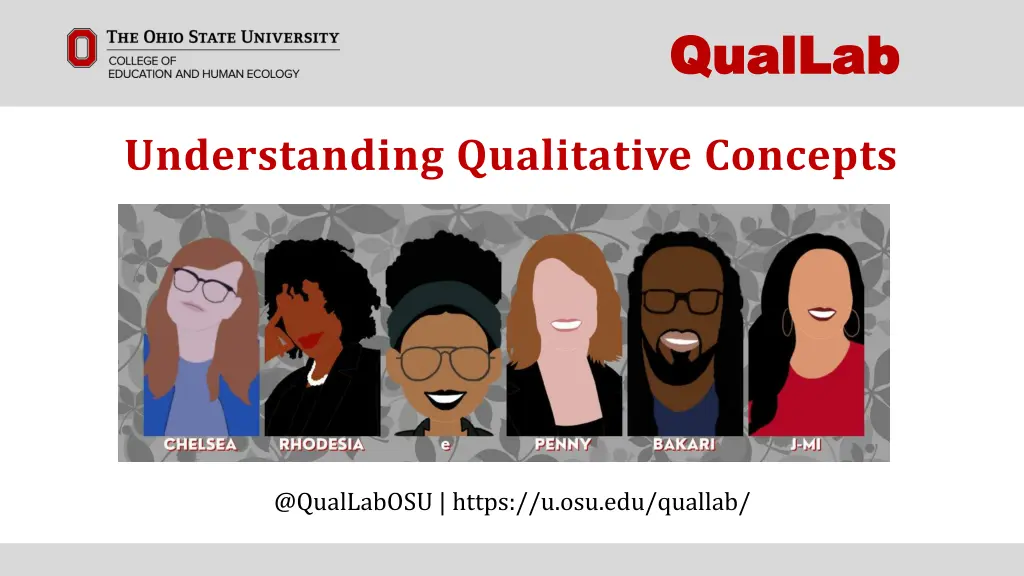
Understanding Qualitative Research Design and Concepts at QualLab OSU
Explore the key components of qualitative research design, including epistemology, axiology, and ontology, at QualLab OSU. Learn about paradigms, project development, and methodology writing. Discover the iterative nature of qualitative inquiry and decision points for researchers. Gain insights into different research approaches like case study, ethnography, and phenomenology. Uncover the tools of knowing in research design such as epistemology and axiology. Dive into the world of research impact and theory-to-practice connections.
Download Presentation

Please find below an Image/Link to download the presentation.
The content on the website is provided AS IS for your information and personal use only. It may not be sold, licensed, or shared on other websites without obtaining consent from the author. If you encounter any issues during the download, it is possible that the publisher has removed the file from their server.
You are allowed to download the files provided on this website for personal or commercial use, subject to the condition that they are used lawfully. All files are the property of their respective owners.
The content on the website is provided AS IS for your information and personal use only. It may not be sold, licensed, or shared on other websites without obtaining consent from the author.
E N D
Presentation Transcript
QualLab QualLab Understanding Qualitative Concepts @QualLabOSU | https://u.osu.edu/quallab/
QualLab QualLab Agenda What is research design? What are epistemology, axiology, and oncology? Understanding paradigms Considerations in project development Writing a methodologies section
5 Parts of A Research Study John Creswell 1 1 Introduction / Problem Statement 2 Literature Review, etc. 2 3 Research Question, Methodology & Methods 3 Research Question/s 4 Findings (with evidence) 4 5 Discussion, Implications, & Conclusion (your thoughts grounded in findings & furthering existing literature here) 5
Qualitative Inquiry is Iterative Pasque, Carducci, Kuntz & Gildersleeve (2012) Problem Statement Discussion & Implications Literature Review Research Question & Design Findings
Researcher Decision Points (AKA Cheat Sheet ) Pasque, P. A. (2020). Figure: Qualitative Research Design The Ohio State University
QualLab QualLab What is a research design? way in which a researcher puts together research methods, underpinned by theoretical principles five common approaches: Case study Ethnography Grounded theory Narrative inquiry Phenomenology often (incorrectly) called a methodology Source: SAGE Research Methods
Ones understanding of what is knowledge and how knowledge is created What one believes exists Four interrelated tools of knowing in research design Epistemology Ontology Praxiology or Praxeology Axiology Sources: SAGE Research Methods Foundations The SAGE Encyclopedia of Action Research The SAGE Encyclopedia of Qualitative Research Methods What one holds as important in the world How one s research impacts the world beyond the study, or theory to practice
QualLab QualLab Defining Paradigm A paradigm is a set of assumptions and perceptual orientations shared by members of a research community. Paradigms determine how members of research communities view both the phenomena their particular community studies and the research methods that should be employed to study those phenomena. - Given (2008), The SAGE Encyclopedia of Qualitative Research Methods
QualLab QualLab Understanding Paradigms Common sets: Positivism (previously traditional ) Constructivism (previously naturalistic ) Critical Perspectives (e.g., feminist, participatory, Marxist) Postmodernism (sometimes placed under critical) Poststructuralism (sometimes placed under critical)
QualLab QualLab Understanding Paradigms Positivism: there is only one universal or correct truth for a phenomenon Constructivism: truth is subjectively co-created by interacting with others and environments Critical Perspectives: knowledge is created by examining and working to shift imbalanced power dynamics Postmodernism: knowledge is fluid and contextual based on how language gives it meaning Poststructuralism: truth is fluid and contextual based on how it is done or performed
QualLab QualLab Project Considerations 1. Each research paradigm places attention on a different aspect of a study topic. 2. Various epistemologies, axiologies, and ontologies frame knowledge differently. 3. Each method of data collection produces different information, and the quality of data is contingent upon the strength and design of collection instruments.
QualLab QualLab Project Considerations 4. Each method of analysis produces different understandings of data based on (a) the focus of an analytical approach and (b) the breadth and depth of analysis. 5. If scholars use theoretical or conceptual frameworks in their projects, they may develop their research approaches, data collection instruments, and/or analytical procedures through the lens of those frameworks.
QualLab QualLab Data Collection Methods Structured Interviews Closed or Fixed- Response Interviews Semi-Structured Interviews Informal, Conversational Interviews Walking Interviews Arts Based Interviews Photovoice / Photo Elicitation Draw a Picture Make a Meal Together Chose a Tarot Card Create RQ s with the community And many more Standardized, Open- Ended Interviews Topical Interviews Life History Interviews In-Depth Interviews Evaluation Interviews Focus Groups Collect Artifacts
QualLab QualLab Data Analysis Methods (Flick, 2014) Grounded Theory Situational Phenomenological Narrative Hermeneutics Netnographic Interpretivist Ethnographic Discourse Qualitative Content Conversational Analyzing observations Analysis with Software (e.g., NVivo) Analyzing documents and news media Constant Comparative Analyzing images, film, and visual data Induction, Deduction, and Abduction Analyzing sounds Videography
Epistemic, ontological, and/or axiological constructs and frames Positioning of constructs or frames in the larger scholarly landscape Research design approaches Theories and/or concepts that frame the study Methods for collecting data Methods for analyzing data Use of software and/or instruments Epistemic, ontological, and/or axiological consistency: Writing a Methodologies Section Study Integrity Trustworthiness tools: bracketing, member checks, triangulation, etc. Positionality and biases Ethical issues: sharing power, telling others stories, establishing relationships while maintaining boundaries, sharing findings with participants etc.
QualLab QualLab Beginner Resources Banks, S., Cahnmann, M., Caulley, D., Clarke, J., Febbraro, A., ... & Woo, Y. (2011). Writing up results. In Lichtman, M. Understanding and evaluating qualitative educational research (pp. 273-286). SAGE Publications, Inc. doi: 10.4135/9781483349435. Denzin, N. K., Lincoln, Y. S., & Smith, L. T. (2008). Handbook of critical and indigenous methodologies. SAGE Publications, Inc. doi: 10.4135/9781483385686. Flick, U. (2014). The SAGE handbook of qualitative data analysis. SAGE Publications Ltd. doi: 10.4135/9781446282243. Flick, U. (2018). The sage handbook of qualitative data collection. SAGE Publications Ltd. doi: 10.4135/9781526416070. Friesen Ph.D., B. K. (Academic). (2017). What is epistemology? [Streaming video]. SAGE Research Methods. https://methods.sagepub.com/video/what-is-epistemology?seq=1. Given, L. M. (2008). The SAGE encyclopedia of qualitative research methods (Vols. 1-0). SAGE Publications, Inc. doi: 10.4135/9781412963909 Iverson, S., & Seher, C. (2017). Developing purpose: A case in the design of feminist qualitative research a study of academic mothers' sabbatical experiences. SAGE Research Methods Cases. doi:10.4135/9781473970694. Mills, A. J., Durepos, G., & Wiebe, E. (2010). Encyclopedia of case study research (Vols. 1-0). SAGE Publications, Inc. doi: 10.4135/9781412957397. SAGE Research Methods. (n.d.). Methods map epistemology. https://methods-sagepub-com.proxy.lib.ohio- state.edu/methods-map/epistemology.
QualLab QualLab Your Researcher Decisions Matter!
QualLab QualLab @QualLabOSU | QualLab@osu.edu | https://u.osu.edu/quallab/
QualLab QualLab See the QualLab website for a Dashboard of Resources, Events, Webinars, etc. @QualLabOSU | QualLab@osu.edu | https://u.osu.edu/quallab/ Follow us on twitter @QualLabOSU


